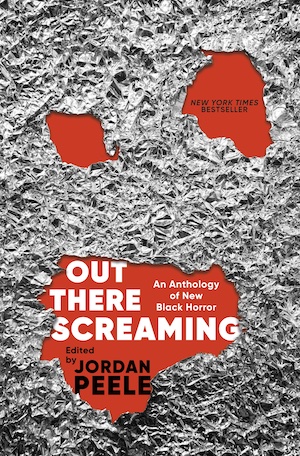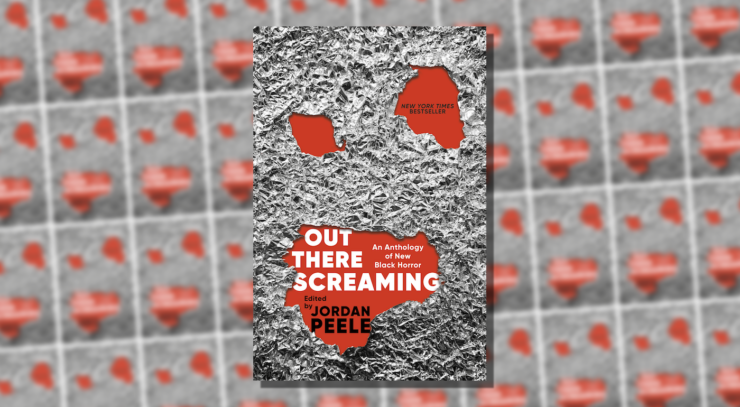“I view horror as catharsis through entertainment. It’s a way to work through your deepest pain and fear—but for Black people that isn’t possible, and for many decades wasn’t possible, without the stories being told in the first place.”
—Jordan Peele, Foreword
“The function of freedom is to free someone else.”
—Toni Morrison
Not only does Jordan Peele craft rewarding horror himself, this anthology marks him a clever curator of the genre. He has an affinity for communicating truth through monstrosity, and here he showcases a range of gorgeous, expertly executed Black horror. Out There Screaming reads like Peele reached out to some of the best genre writers alive and told them we’re doing this. Don’t you dare hold back. The choices of his career appear to have empowered them to trust this promise, because the result is a bloody, brilliant gut punch. The anthology delivers exactly what it promises: an all-star lineup of heavy hitters and fresh voices given free reign and resources to knock it out of the stratosphere. These creatives revolutionize the genre—or more accurately, reveal it for what it always has been.
In his foreword, Peele writes of the oubliette: a simple medieval torture device in which prisoners are thrown into a narrow, bottle-shaped chamber. All the suffering of being buried alive but forced to stand, often with the additional cruelty of being located strategically near parts of the castle where one might smell feasts or hear merriment. The prisoner’s cries become background entertainment for the goings-on of the castle, to be enjoyed or ignored at whim.
Condemned, constricted, knowingly tantalized with another life. A slow, simple torture. Often they don’t bother retrieving the bodies. The name derives from the French oublier—“to forget.” This became foundational for Peele’s construction of the Sunken Place.
With this anthology, Peele asks nineteen Black authors to share the myriad shapes of their own Sunken Places, their oubliettes. “They are raw imaginings of our deepest dreads and desires,” he writes. “And they will not be forgotten.”
Buy the Book


Out There Screaming
What is horror but a reckoning? What is horror but the facts of an unequal world, unfettered? These stories are brilliant, brutal, and delicious, the sort that root in the hollows of your bones. Pinnacles of the genre, platonic ideals of the form. Some draw from African or diaspora storytelling. Some are set in volatile periods of history, some in the near future consequences of present horror. All interact with familiar touchstones that ground the reader in the realities that beget this horror. White supremacy lives here, gruesome and unmistakable, slavering through the film of collected fictions, chomping at the bit.
I highly recommend Desiree A. Evans’s essay “We Need Black Horror Now More Than Ever.” She writes “When so much is out to erase your very existence, fear becomes a constant part of your life. In horror I see my fear and terror at a world beyond my control reflected back at me. For Black people, horror can provide a safe environment to process the trauma from our daily lives.” She references Peele, but also emphasizes:
Even before Peele, Black horror had a rich literary lineage going back to the folklore of Africa and its Diaspora […] Black horror can be clever and subversive, allowing Black writers to move against racist tropes, to reconfigure who stands at the center of a story, and to shift the focus from the dominant narrative to that which is hidden, submerged. To ask: what happens when the group that was Othered, gets to tell their side of the story?
Desiree A. Evans
There’s a vicious joy in bearing witness to white supremacy’s horrors evoked as true horror. The underlying monstrosity here is not fiction. Good horror reveals the brutality of reality: what is accepted and shouldn’t be, cannot be. You think it’s a funhouse mirror, distorting reality, but it’s only reflecting the truth.
Yes, it is this grotesque, pervasive, unacceptable on a cellular level. The glittering teeth trauma makes, the worn whetstone. An arsenal of rage forged in the bloody remainders of generational wounds. A book that carves a path clear and forces you to look at the thorny rotten system it cut through. Each author delivers stories rooted in recognizable reality but thoroughly imagined, and the result is brutal as fuck and just as fun.
Because this is a fun book. It ranges in tone but that wry humor is present often. The intersection of horror and humor can make for the sort of satisfying absurdity Peele’s known for, and it shines throughout. Consistently expert in execution and smoothly arranged, leaving no standout weaknesses or jarring bits of pace. It’s not necessarily a joyous book—that would be weird—and not every story ends on something like catharsis. But the collection is well-balanced and satisfying, and while at times it’s brutal to read, it’s crafted with care. I trust that, if you’ve seen a Peele film, you have a sense of what I mean. This isn’t about re-traumatizing. It’s excavation, reclamation, vindication. Legible and ruthlessly present.
Each story stands alone, but themes and motifs resonate throughout. The anthology opens with N.K. Jemisin’s “Reckless Eyeballing,” a slick, visceral story of policing—systemic, internal, metaphysical. It’s a high-octane contemporary, a twisted, unsubtle grin at the police and possibly my favorite in the collection. Chesya Burke’s lushly crafted masterpiece “An American Fable” also explores policing and Blackness, the venomous reach of American imperialism and the structures created to eat their own.
Several authors delve into the darkness of myth-making, fable-like in tone. Erin A. Adams’s “Lasirèn” is as mature and macabre as the best original dark fairytales. A hefty, vicious, splendidly crafted story, it hinges on the tenebrous nostalgia of children’s games and the betrayal of brutal reality.
Nicole D. Sconiers also confronts the violent undercurrent of so many children’s stories and small town folklore. “A Bird Sings by the Hanging Tree” is a slant, necessary reframe of agency. An origin story of hunger and haunting off a highway in suburban Pennsylvania, a reclamation of monstrosity folded into wry humor and righteous rage.
P. Djèlí Clark’s “Hide & Seek” charges the childhood game with fresh terror. A powerhouse opening launches a gruesome tale of addiction and its children. Gory and good, this is sickly human horror that will resonate for fans of “The Haunting of Hill House” and “The Walking Dead.” A magnetic, original tale, written with narrative command so tight it made me shiver.
While some veer toward Peele’s more humorous work, others are more extreme horror, nearly nihilist and just as expertly executed. Ezra Claytan Daniels’ “Pressure” is Nope meets Don’t Look Up crossed with Melancholia and Succession’s Roman rocket storyline. L.D. Lewis taps this vein too, “Flicker” delivering a grown-up Wreck-it Ralph, or if Free Guy were horror. There’s the appeal of The Boys and Annihilation here too, a surreal, spot-on gut-punch.
Maurice Broaddus’ “The Norwood Trouble” reads like the pilot (aka the best of) the Lovecraft Country adaptation. Stunning and elegant, it confronts how recent and normalized the horrific threat of lynching. The realities of being governed under a nation whose previous generation casually, permissively at best, benefited from slavery.
Rion Amilcar Scott’s “A Grief of the Dead” is a voicey, sickening, structurally clever evocation of grief. As his protagonist navigates a world of walking dead and the too-easy logistics of mass shooting, the reader understands just how close to this fever pitch of systemic inequity we already are.
Terence Taylor’s “Your Happy Place” also hits eerily close, rooted in the very real ways the prison population is maintained and exploited. Those in power encourage you to rationalize anything that keeps them that way. “They sold it well.” “It seemed like a dream come true.” The inherent violence of a choiceless capitalist carceral system—you either help maintain it or you suffer. This will appeal to fans of Andor and Severance, with touches of Black Mirror and Torchwood’s “Children of Earth,” though I’d argue this story accomplishes far more than the latter two.
In the lighter fare, Rebecca Roanhorse’s “Eye & Tooth” wields root magic to ask—what if the gig economy came for monster hunting? Lesley Nneka Arimah’s writing is so smart it’s awful, so true it’s sexy. On the Peele upsetting scale, her “Invasion of the Baby Snatchers” gets an Us.
While several stories write out of past or present, Justin C. Key and Nnedi Okorafor both deliver techy, twisty tales in the near future. Tech can be haunted like anything else, and the original ways these authors tackle the concept feels fresh and chilling. “Dark Home” evokes the disorientation of diaspora and parental grief, one of my new favorites among Okorafor’s work. And if you happened to enjoy either the Scott Westerfeld series Uglies or the DCOM Smart House in your formative years, you might enjoy this one and Key’s “The Aesthete” as much as I did.
I’d call this lineup all hits no misses, but two of the heaviest hitters are, fittingly, the open and the close. After finishing the anthology, N.K. Jemisin’s hadn’t budged from its place as a favorite, but Tochi Onyebuchi’s ”Origin Story” finale shot up to join it. I screamed aloud. This form! The confident, brilliant hysteria! Lord of the Flies but openly about white anxiety, this read like a Godot for our generation, only sharper, closer, funnier and more brutal. The wildness of it all, this nightmare of cruelty. “Fancy thinking evil was something you could co-opt and make heroic. Fancy thinking you could be evil to save others.” Onyebuchi gets at the gnawing monstrosity—how deep the simulation burrows, how engrained in how we tell stories.
These resonances feel awful, and true. Different interrogations of the many monsters white supremacy makes. Refrains of the mundane maintenance of a horrific system. What we witness, willfully ignore, or choose to hide. Reckoning with what’s inside that oubliette, and who put it there, and what it might look like if it breaks free.
“I will cast abominable filth at you, make you vile, make you a spectacle.”
Nahum 3:6, the opening quote to Nope
How do we raise the dead? How do we give voice to those whose screams weren’t simply unheard, but willfully enjoyed? What is horror to someone who cannot help but live in its legacy? It comes down to lens, and who gets to tell the story.
None of this monstrosity is quiet, or subtle. Out there screaming, screaming! This is already reality. Like most of what Peele does, this anthology is at once extremely of the moment and heavy with lineage. A killer lineup—some of the best writers of the genre given free range to fucking bring it.
A magnum opus of sorts, this compilation. An unflinching, unapologetic, viscerally satisfying volume. A thousand elegies, unearthed and howling free.
Out There Screaming is published by Random House.










